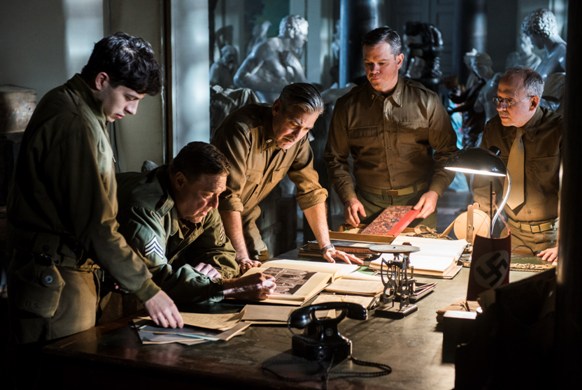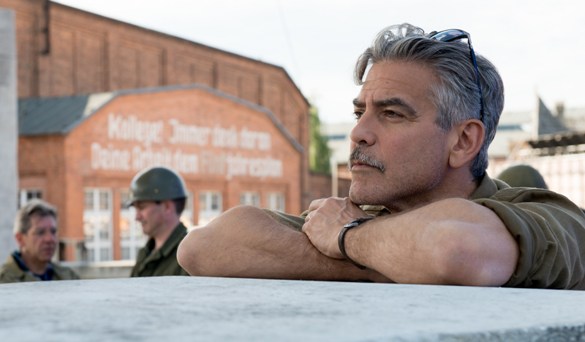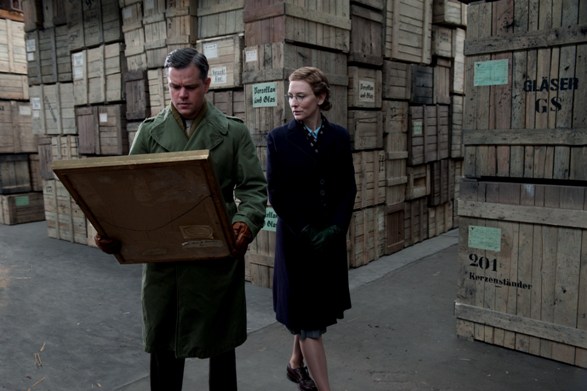What was it about Hitler and the arts? It’s well known that he was an aspiring painter, twice attempting – and failing – the entrance examination of the Academy of Fine Arts in Vienna. It’s no stretch of the imagination to figure that his failure had something to do with his attitude towards modern art (in a word, degenerate). But it goes further. The classical styles Hitler favoured were deeply symbolic, in his mind at least, of the values he championed, the ethnic purity underpinned by “blood and soil”. Hitler used art as a statement of identity: communal, national, racial. None of this thinking is particularly radical in itself, but given the evolution of National Socialism, it should to stand as a warning about the dangers inherent in contemplating art for art’s sake alone.

I think it’s important to keep this thought in mind whilst watching The Monuments Men, the new George Clooney vehicle, that hovers uncertainly between derring-do humour and sombre reflection concerning the awful consequence of war. It falls between the two, unsurprisingly and unsatisfactorily. I can imagine a over-enthusiastic film-exec pitching the script now: “Think Ocean’s Eleven meets Truffaut’s The Last Metro.” The correct thing to do, I think, would have been to put this misconception out of its misery at birth.
It’s 1943, and the tide of war has begun to turn in favour of the Allies. Clooney is art historian Frank Stokes (I think he’s an art historian: As far as I can tell, the film never actually sets out Stokes’ credentials for the task at hand) passionate about preserving the cultural artifacts under threat since the start of the Second World War. There’s the danger of collateral damage from combat; but also, Hitler has plans for a Fuhrermuseum, a gargantuan repository for his notion of Aryan cultural superiority. The thing is, you need art to fill a museum, and so the Nazis are systematically looting museums and churches and private homes across occupied Europe. Clooney convinces President Roosevelt to allow him put together a team to track down these spoils of war and return them to their rightful owners before they are lost, forever.

The first problem with The Monuments Men comes lies within its narrative arc. The unique selling point that attaches to Clooney’s irregulars is that they the men least likely to: architects, historians and curators who’ve never been asked to fire a gun in anger. Expecting them to tag along with combat troops in the wake of the D-Day landings is a big ask; getting them to convince said troops that preserving an old church is worth the additional risk to life and limb is even bigger yet. No surprise, our Monuments Men are fish out of water. Aside from Clooney (swoontastic, admittedly, but hardly in the first flush of youth), the team includes Bill Murray, John Goodman, Bob Balaban and Hugh Bonneville, fine comic actors all but with a collective age of about 694. They offer the potential for comedic diversion, but the humour feels stilted, forced; it might be that our Men might have felt more at home not just in another war but in another film altogether.
Matt Damon (he’s only one of the number who could conceivably be at home on the front; oddly enough, he’s actually been the subject of a wartime rescue himself, in Spielberg’s Saving Private Ryan) has gone up ahead to find out what happened to the goodies looted from newly liberated Paris’s museums. (There’s a joke here about why the Germans bombed London and not Paris: like all the genuinely good bits in the film, blink and you’ll miss it.) There, meets Clare (Cate Blanchett), an art curator forced to work with the Nazis and thus in possession of the detailed information needed to locate and rescue the art. Clare, however, is deeply suspicious of anyone claiming to be interested in art for art’s sake (a quarter of an hour with Hermann Goering would do that to anyone), and must be convinced that the intentions of the Monument Men are true.

They say that film-watching audiences have the attention of goldfish, so I suppose this informs that film’s decision to focus on specific art works as narrational anchors: A Van Eyck altarpiece from the cathedral in Ghents, a statue of Madonna and Child by Michaelangelo. The individual strands taken by themselves all have some merit. But as a whole, the storyline feels disconnected, even contrived. What they are doing could be interesting, but the who and (most importantly) the why feels terribly unformed.
There are some things that do work well though. There’s a moment where Damon finds a painting stolen from a Jewish family, deported to a fate that probably doesn’t bear thinking about. He takes it back to their abandoned home, hangs it on the wall of the otherwise bare apartment. What’s the point, Clare asks him. The point is that we want to return these to the rightful owners, he replies. It would be easy to think about this scene as mawkish, even contrived, but it makes the genuine connection between the abstractions of plunder and the human factor, a connection that doesn’t really work its way through the film. There’s another scene, involving gold fillings, that feels much more forced. Of course, it might just be that given the balance between humour and truth that the film tries to find, it is merely the context that is wrong. The truth can never feel forced.
But I think the main failing of the film is conceptual. Is Art a means to an end, or the end in itself? It’s a terribly important question. Hitler thought the latter, we all know. There is no shortage of supposedly cultured individuals interwoven into the fabric of mankind’s brutal history; people who never got the fact that it is the illumination that art sheds on the less-examined aspects of everyday life that matter, rather than the physical representation itself. It feels a bit unkind to say this, but I’m not sure that The Monuments Men demonstrates a full understanding of this distinction either. Clooney makes a couple of solemn speeches about the hollowness of victory in war if our (our? That’s a good question, but this is neither the time nor the place) cultural treasures are not preserved. Later, he’s asked if the attempt to preserve these treasures were worth the sacrifices entailed, including the loss of human life. The answer, naturally, is yes. But The Monuments Men never really says why the right answer should be yes.
The Monuments Men (2014)
Directed by George Clooney, written by George Clooney and Grant Heslov
Starring George Clooney, Matt Damon, Bill Murray, John Goodman, Jean Dujardin, Bob Balaban, Hugh Donneville and Cate Blanchette
118 Minutes, English/French/German w. Hebrew subtitles





